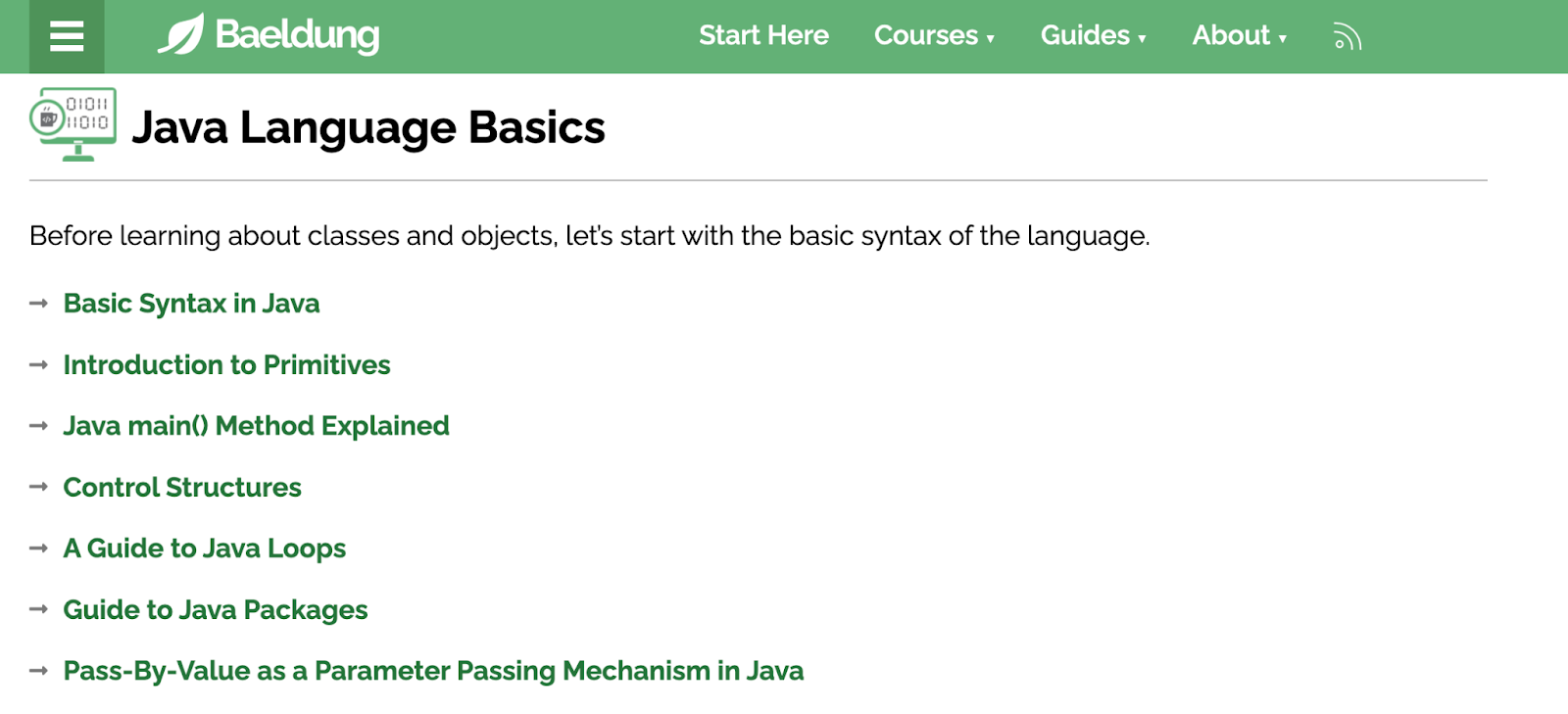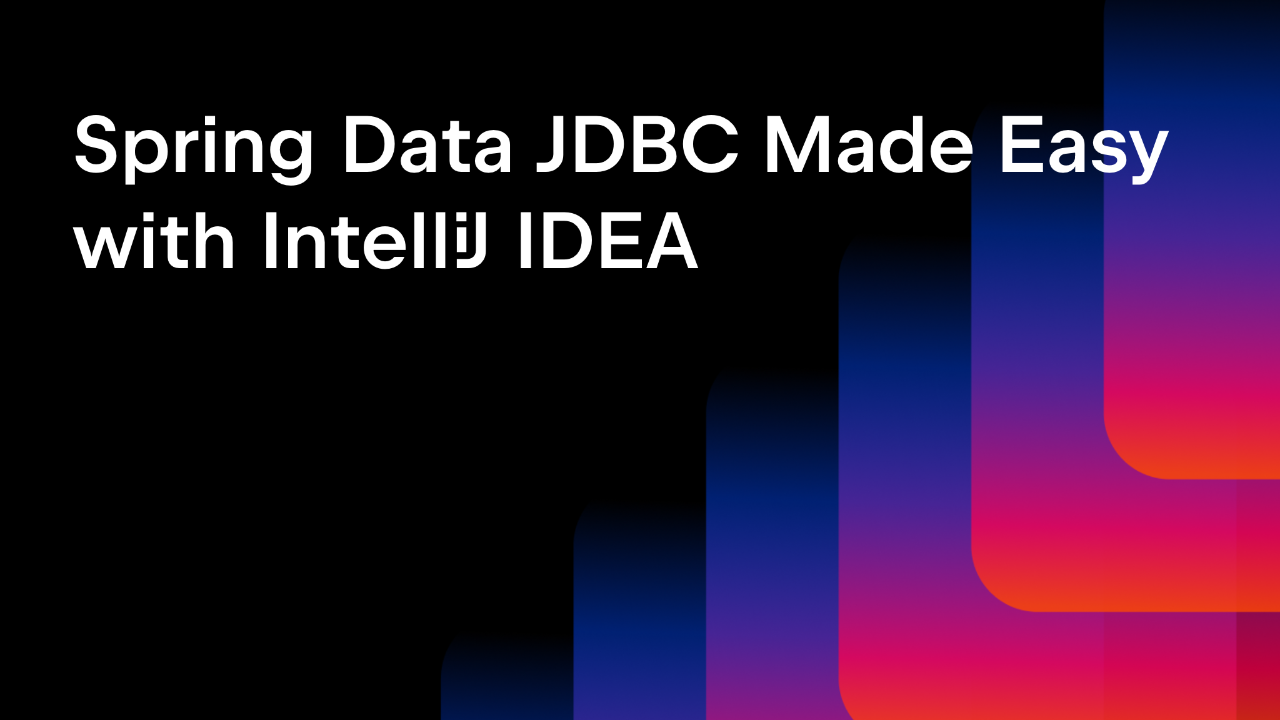IntelliJ IDEA
IntelliJ IDEA – the Leading IDE for Professional Development in Java and Kotlin
The Best Ways to Learn Java
Starting with Java can feel overwhelming – there are so many options and so little time. That’s where this article comes in handy – consider it your roadmap to learning Java with ease. Whether you’re just starting out or have watched every Java tutorial in existence but still feel stuck, we’ve compiled interesting resources and insights to help you on your Java journey.
Without further ado, then, let’s dive right in!
Online courses
The easiest and the most obvious approach to learning Java is to try online courses. However, the education market is so overcrowded that choosing one can cause anxiety and kill your motivation. Don’t worry, we have some recommendations for you.
JetBrains Academy
Our educational brand JetBrains Academy boasts a community of over a million students who rely on a project-based approach to acquire technical skills. The seamless integration into the learning process of JetBrains IDEs – the daily tools of professional developers – smoothens the learning curve when stepping into a new role.
With JetBrains Academy, you’ll start from the ground up, creating chatbots, games, and even neural networks.
JetBrains Academy features numerous projects for Java beginners, but these are the best to start with:
- Simple Chat Bot with Java – Create a tool to simplify your everyday tasks.
- Coffee Machine Simulator with Java – Program a virtual barista.
- Cinema Room Manager – Create an app to manage a cinema, including functionalities for ticket sales, seat availability tracking, sales analytics, and more.
- Battleship with Java – Create your variation of the classic Battleship game and play it with your friends!
Java Programming by the University of Helsinki
Join the University of Helsinki’s free online course on Java – no experience is necessary. Learn Java basics, algorithms, and object-oriented programming with exercises and automatic testing. This real-world course uses professional tools and covers the same material as our in-person programming classes.
The course is divided into two parts, each with seven sections and their accompanying exercises. Each part requires about 5–20 hours, with a recommended minimum of 10 hours depending on your computer skills. You also get a certificate for completing each part.
Java Programming by Angie Jones
Angie Jones, known for her expertise in Java, teaches the Java Programming course in a way that’s engaging and easy to understand. This course is great for anyone new to Java or looking to brush up on their skills, covering all the basic elements of the language clearly and thoroughly.
Fellow developers
Another way for you to start learning Java is by seeing what other developers are up to. Who knows the highs and lows and tips and tricks better than someone who’s been through it all? Below, you’ll find a list of people and communities where beginners can find helpful Java stuff.
Foojay – This is a vibrant developer community and knowledge base that can make your life as a Java newbie a bit less puzzling. They’ve got a section for beginners where they share information about setting up Java and taking the first steps in coding. If you’re feeling adventurous, they’ve handpicked a bunch of articles and tutorials from their star contributors for those who are just starting out.

Baeldung – Their website provides tons of helpful information and news. The most interesting for beginners is the Get Started with Java section, which contains a collection of tutorials that is a great starting point for your Java journey.

Programming with Mosh – Mosh Hamedani makes programming fun and simple. We recommend the Java Tutorial for Beginners video to start with.
Cracking the Java Coding Interview – The official Java channel offers a series of engaging one-minute videos focusing on answering the most frequently asked Java questions that you might encounter in job interviews.
Books
Books have a lot of advantages for those who choose a focused, self-paced way to learn. When you study with books, you get a clear, step-by-step guide, complete with examples that don’t vanish from the screen. If you love the feeling of turning pages and gradually absorbing knowledge, then picking up books to learn Java is likely the perfect choice.
Check out what books we’ve found for you!
Head First Java, 3rd Edition – This book is famous for its engaging, interactive approach to learning Java. It uses a visually rich format that’s designed for the way your brain works, making it a great choice for beginners. The book was updated in May 2022, ensuring it includes recent information about Java.
Core Java – This book is great for really understanding Java and its APIs. Cay S. Horstmann uses lots of real-life examples to show you the best ways to use Java effectively.
Think Java – This popular introductory book, widely used in educational institutions, provides an accessible approach to Java for those with little to no programming background. More than just teaching Java, it aims to cultivate a computer scientist’s mindset.
Java: A Beginner’s Guide – The book covers basic topics like how to create, compile, and run a Java program. With that knowledge, you learn essential Java keywords, syntax, and commands and then pass to more advanced topics, like multithreaded programming, generics, Lambda expressions, and Swing.
Java in 21 Days – Imagine learning the ins and outs of Java in just 21 days. With 21 neatly packed lessons, this book introduces you to the core concepts and essential techniques of Java.
Also, consider checking out the OCA/OCP Java certification books. Even if you’re not planning to take the exam, these books are really helpful. They explain Java in an easy way and point out the tricky parts that might trip you up as you’re learning.
Creating your project
Another piece of advice is to start your project and immediately test all of the theoretical concepts. You will be able to get a feel for the language and gain hands-on experience with an IDE, learning valuable shortcuts and customizing it to your liking.
If IntelliJ IDEA is your IDE of choice, consider beginning with the Onboarding Tour available right from the welcome screen under the Learn tab. This guided tour will boost your confidence in navigating the development environment and give you a firsthand look at how Java code functions in a practical setting. Also, take a look at our tips – they’re a simple way to improve your IntelliJ IDEA and Java skills with quick, helpful advice on the selected topic.
After completing the onboarding process, you’re ready to create your project. A great way to start is by following this step-by-step video.
Once you’re confident about your first steps, search online for beginner Java project ideas and pick one that interests you, like building a calculator or a to-do list app. Try out your theories for solving the project. If you encounter difficulties, use online tutorials and guides that break the project into smaller, more manageable steps.
Coding challenges and katas
Coding challenges are a perfect playground for Java newbies looking to test their Java skills. It’s a bit like learning to swim by jumping into a pool – a quick, sometimes chaotic, but incredibly practical way to apply your Java knowledge.
Coding challenges usually offer problem-solving exercises that vary in terms of complexity and scope and provide real-world scenarios. The feedback you get is often about whether your solution was right or wrong, but you might also get details on how your code performed in terms of efficiency.
Below you will find some amazing challenges to try out:
Katas refer to repetitive exercises that focus on training specific coding skills. They are usually simpler than coding challenges and are meant to improve proficiency in a particular aspect of coding, such as refactoring or learning a new programming language syntax.
You may want to try one of these:
JUGs
Getting started with Java User Groups (JUGs) is like having a supportive team to help you with the basics and answer all of those tricky questions that come up on the way. These communities are great for keeping up with Java’s latest updates. Plus, you might find an experienced developer who will be happy to take a look at your code and offer improvement tips. Don’t be shy to ask someone for advice – a little guidance at the beginning of your journey can be a big help in sharpening your coding skills!
See if these groups exist in your region. If not, you can listen to some podcasts about various JUGs or check whether the JUGs have any gatherings you would like to attend. Sometimes we announce meetings in Java Annotated Monthly.
We hope these tips encourage you to learn Java. It’s a reliable and promising language that is great for a variety of different projects. Our suggested methods aim to make learning Java fun and effective, whether you’re just starting out or looking to improve your existing skills.
P.S. Please feel free to post any useful Java learning resources in the comments section!
Subscribe to IntelliJ IDEA Blog updates










